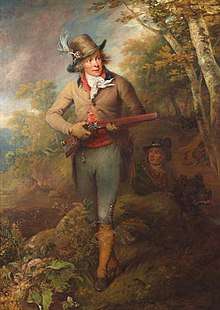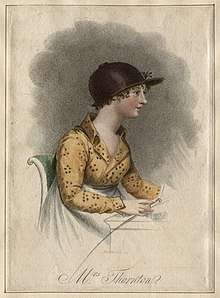Thomas Thornton (sportsman)
Thomas Thornton (1751/2–1823) was an English sportsman, known for his assiduity in hunting and other outdoor pursuits, and in betting.

Early life
He was the son of William Thornton of Yorkshire, Member of Parliament for York, 1747–54 and 1758–61; his mother Mary was the daughter of John Myster of Epsom. Born in London, he was sent to Charterhouse School, and matriculated at Glasgow University in 1766.[1][2] He entered Trinity College, Cambridge in 1771.[3]
Succeeding to his father's estate, Thornton became a keen sportsman, and revived falconry. He was appointed colonel of his father's old regiment, the 2nd West Yorks Militia, but resigned in 1795. In 1786 he undertook a sporting tour in the Scottish highlands. He chartered the sloop Falcon, and partly by sea and partly by land travelled through the northern and western highlands, dividing his time between hunting, shooting, angling, and hawking.[1]
In 1789 Thornton bought Allerton Park from Frederick, Duke of York. He renamed it Thornville Royal.[4]
French visits
Thornton visited France before the French Revolution, and, with his supposed wife Alicia Thornton, revisited it in 1802, during the Peace of Amiens. He was introduced to Napoleon, to whom he presented a pair of pistols, and he joined some French hunting parties. He intended the purchase of a French estate; but difficulties of naturalisation and the renewal of the Napoleonic Wars frustrated the project.[1]
Later life
In 1805 Thornton disposed of Thornville Royal to Charles Stourton, 17th Baron Stourton, and apparently resided in London for a time. He later lived at Falconer's Hall, Bedfordshire, Boythorpe, Yorkshire, and Skypark, Wiltshire.[1][3]
In September 1814, with a party of sportsmen and a pack of hounds, Thornton landed in France, and at Rouen attracted a crowd of spectators. He returned to London in March 1815 at the period of the Hundred Days, but after the battle of Waterloo he went back, hired the Château de Chambord, and purchased an estate at Pont-sur-Seine: he styled himself Prince de Chambord and Marquis de Pont. In 1817 he obtained legal domicile in France, and he applied for naturalisation; but the application did not go through.[1]
In 1821 Thornton sold Pont-sur-Seine to Casimir Pierre Périer. He latterly took lodgings in Paris, where he died on 10 March 1823.[1]
Works
In 1804 Thornton published A Sporting Tour through the Northern Parts of England and Great Part of the Highlands of Scotland. It was noticed in the Edinburgh Review of January 1805 by Walter Scott. The work was republished in 1896 in the "Sporting Library" of Sir Herbert Maxwell, 7th Baronet.[1]
Letters to the Earl of Darlington, giving an account of Thornton's second French trip, were written up by a clergyman named Martyn, and appeared in 1806 under the title of A Sporting Tour in France.[1] Martyn may have acted as ghostwriter also for the 1804 book.[2] A French translation of this work appeared in 1894 in the Revue Britannique. In 1806, also, a pamphlet appeared, vindicating Thornton's conduct in a quarrel with a Mr. Burton.[1]
Family
Thornton was perhaps twice married: possibly firstly to Alicia Thornton, so-called, thought by Charles Fothergill to be his mistress.[2] She was the jockey, riding side-saddle, in two challenges of 1804–5, on which Thornton placed large bets, and which made him notorious. In the first, of 1804, at Knavesmire over four miles and associated with the York race meeting, Alicia rode Thornton's horse Vinigrillo, against a Captain T. Flint who was her brother-in-law, and lost. For the following year's York meeting Alicia rode against Frank Buckle, and won; but Thornton was horsewhipped by Flint, after refusing to honour the bet of 1000 guineas he had made on the 1804 race. Alicia eloped with a soldier in 1806.[2][5]

Thornton married at Lambeth, in 1806, Eliza Cawston of Mundon, Essex, by whom he had a son, William Thomas, born in London in 1807. By a will executed in London in 1818 he bequeathed almost all his property to Thornvillia Diana Thornton, his illegitimate daughter, then aged 17, by Priscilla Duins. The will was disputed by his widow on behalf of her son, and both the prerogative court and French tribunals pronounced against its validity.[1]
Notes
- Lee, Sidney, ed. (1898). . Dictionary of National Biography. 56. London: Smith, Elder & Co.
- Middleton, Iris M. "Thornton, Thomas". Oxford Dictionary of National Biography (online ed.). Oxford University Press. doi:10.1093/ref:odnb/27364. (Subscription or UK public library membership required.)
- "Thornton, Thomas (THNN771T)". A Cambridge Alumni Database. University of Cambridge.
- Historic England. "Allerton Park, Allerton Mauleverer with Hopperton (1000402)". National Heritage List for England. Retrieved 8 January 2020.
- Brailsford, Dennis. "Thornton, Alicia". Oxford Dictionary of National Biography (online ed.). Oxford University Press. doi:10.1093/ref:odnb/58879. (Subscription or UK public library membership required.)
External links
- Attribution
![]()